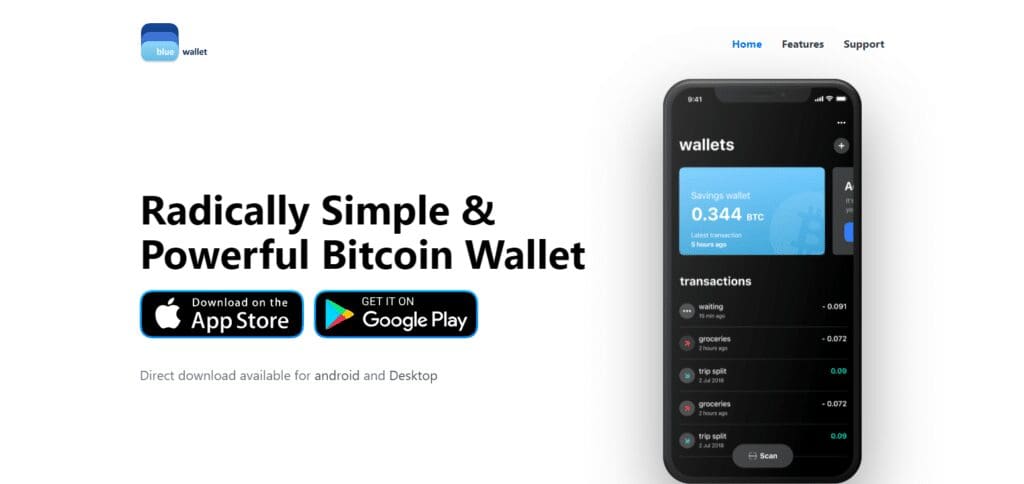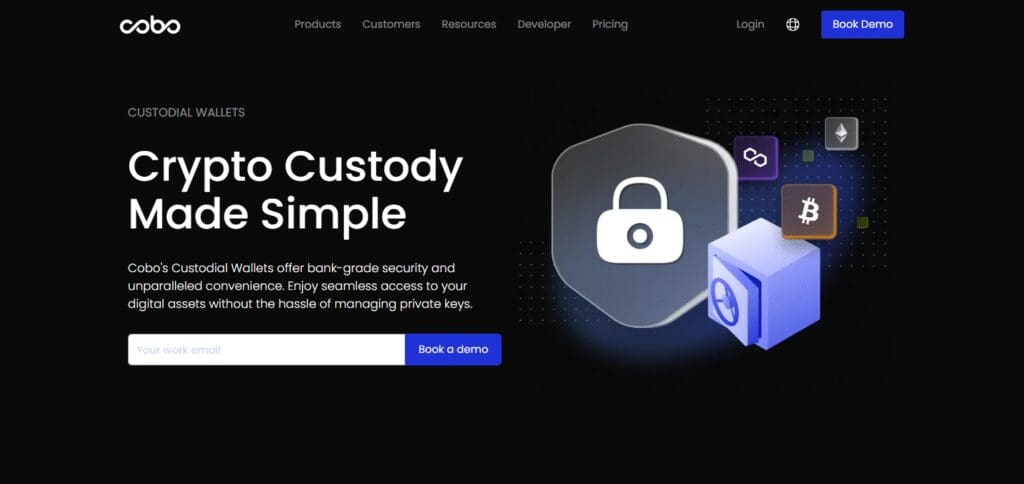In this article I will cover the Best Crypto Wallets for Beginners, focusing on those which is user friendly, secure and have necessary features.
If you want to keep your Bitcoin, Ethereum, or other several cryptocurrencies safe, then the selection of the wallet for such purpose is of paramount importance.
I will focus on wallets targeting simple ownership of digital assets along with safety and access for the more inexperienced users of crypto.
Key Point & Best Crypto Wallet For Beginners List
| Wallet | Key Points |
|---|---|
| MetaMask | Easy-to-use, Ethereum & ERC-20 support, DApp compatible |
| MyEtherWallet (MEW) | Open-source, full control of keys, Ethereum focused |
| Coinomi | Multi-currency, 1,700+ assets, built-in exchange |
| Atomic Wallet | Multi-currency, staking, built-in exchange |
| Blue Wallet | Bitcoin-focused, Lightning Network support |
| Ledger Nano S Plus | Hardware wallet, secure offline storage, wide crypto support |
| Ellipal Titan | Air-gapped, QR-based, offline, secure storage |
| KeepKey | Easy-to-use, hardware wallet, ShapeShift integration |
| Cobo Wallet | Multi-currency, staking, hardware wallet support |
| Phantom Wallet | Solana-focused, NFT support, DApp compatibility |
10 Best Crypto Wallet For Beginners
1.MetaMask
In the crypto world, MetaMask serves as a good starting point for newcomers as it is simple to use and set up.
This allows for the use of Ethereum and tokens on the ERC-20 network which are required for the use of DApps.

Local keys allowing for key backups through phrases are also safeguarded thus providing a wide array of DApps in a safe manner.
This clear interface combined with seamless integration definitely qualifies MetaMask as a gateway for novice crypto users.
Pros & Cons MetaMask
Pros:
- It allows access to multiple Ethereum-based token assets and DApps.
- Has an excellent integration as a mobile application and a browser extension.
- New features are added periodically and security measures are improved.
Cons:
- It solely supports ETH and all the ERC-20 tokens only.
- May be susceptible to phishing attacks when used without caution.
- Transaction fees depend on the congestion of the network and can become quite high.
2.MyEtherWallet (MEW)
MyEtherWallet (MEW) is perfect for beginners who wish to have an easy-to-use, open-source wallet for Ethereum and ERC-20 tokens.

It allows full control over private keys and offers a simple initial configuration.
MEW’s features make it easy for users to manage their assets, trade with DApps, and back up their wallets using a seed phrase which makes it ideal for those new to cryptocurrency.
Pros & Cons MyEtherWallet (MEW)
Pros:
- It is open-source which accounts to total transparency.
- It supports hardware wallets which can be used for greater security feature.
- It gives users an ability to interact with DApps without any intermediaries.
Cons:
- It is restricted to Ethereum and erc-20 tokens only.
- Sometimes the graphical interface is confusing for new users.
- The private keys handling is critical in terms of protection.
3.Coinomi
Coinomi is a great choice for new users as its one of the hot crypto wallets offering support for over 1,700 assets, perfect for users wishing to maintain a diverse portfolio.
Such requirements are met by Coinomi’s user-friendly layout, builtin exchange, and stake options.

Coinomi ensures the safe keeping of private keys with off-site storage and backup, it is great peace of mind also.
Having so much wide asset support and easy to start with setup, Coinomi is great for starters in the crypto world.
Pros & Cons Coinomi
Pros:
- It supports 1700+ cryptocurrencies from different blockchains.
- It has an integrated exchange feature for straightforward asset swapping.
- It guarantees a high level of privacy with no KYC done.
Cons:
- It has not been made open source which somehow affects transparency in some of its users.
- It lacks multi-signature functionality.
- It tends to be resource-intensive especially on mobile where many assets are stored.
4.Atomic Wallet
Atomic Wallet is a great option for beginners as it has an intuitive interface and supports more than five hundred cryptocurrencies.

Since it has a built-in exchange and staking options which allows participants to manage, swap and earn rewards on their assets.
Atomic Wallet also has encrypted private key storage and backup to enhance security, thus making it a secure and easy-to-use wallet as an introduction to people new to the crypto world.
Pros & Cons Atomic Wallet
Pros:
- The number of coins and tokens which it supports goes into hundreds.
- Fully functional internal DEX for easy trade.
- Allows staking on supported assets for earning.
Cons:
- Does not support hardware wallets for enhanced security.
- Could be slow and not responsive in customer support.
- Some functionality is missing for more advanced users.
5.Blue Wallet
Blue Wallet is nice for newbies, especially people new to Bitcoin and the Lightning Network.

They have a lightning network feature that allows for faster and cheaper transactions.
For beginners wanting to manage Bitcoins without much hassle, Blue Wallet is ideal for them as it has easy configuration, competent security of the private keys and makes receiving and sending bitcoins effortless.
Pros & Cons Blue Wallet
Pros:
- Easy tp use even for users who are new to Bitcoin and Lightning Network.
- Integrates with multi-signature for: Maximum security.
- Simple to use with integration with Bitcoin’s Lightning Network.
Cons:
- Only usable on Bitcoin and Optimally Lightning Network.
- Would not be suitable for users who would want to invest in more altcoins.
- Multi-sig would need more technical proficiency for understanding which is a downside of having a multi-sig.
6.Ledger Nano S Plus
The Ledger Nano S Plus is a good entry-level hardware wallet that will serve any beginner well.

It supports a large array of cryptocurrencies and quite securely stores its offline private keys fully eliminating hacks.
The onboarding process is straightforward, has a smooth interface, and considering that it is a user’s first time using cryptocurrency, their assets are quite secured through pin protection and a recovery phrase backup.
Pros & Cons Ledger Nano S Plus
Pros:
- A large number of coins can be stored.
- Greatly decrease exposure to online threats by making use of cold wallets.
- Intuitive design with good setup instructions available.
Cons:
- Hardware wallet means extra steps for ease of use when performing regular transactions.
- Storing many applications at one time on the device may not be feasible due to low additional storage.
- An initial cost incurred may be reported as high compared to virtual wallets.
7.Ellipal Titan
The Ellipal Titan is a perfect option for those who are just beginning their cryptographic adventure, and want to keep their assets secure at all costs.
This is a hardware wallet that is air-gapped, which means it never connects to the internet.

Because of this, its assets are safe from any risk that can be incurred online. It is quite easy to operate thanks to its simple interface and QR code transactions.
Considering that it possesses a large variety of digital currencies support and its assets are stored in offline, the Ellipal Titan is without a doubt a great device for all the novices who want the possibility of making mistakes minimized while they are exploring the sahdlh.
Pros & Cons Ellipal Titan
Pros:
- Maintains total air gap for online threat detection and mitigation.
- Metal casing designed to withstand any physical earning damage.
- Conducts QR code transactions, bypassing USB or Bluetooth security issues.
Cons:
- More expensive than other wallets in the market.
- Less convenient for travelling because more bulky.
- Some of these third party apps don’t support them.
8.KeepKey
It is easy to use KeepKey wallet which is great for newcomers.
The KeepKey wallet allows storage of cryptocurrency offline and has a simple user interface.

A wide range of assets are available via KeepKey, and its association with a ShapeShift account facilitates instant trading.
It comes with PIN code protection and a recovery phrase backup in order to offer a user-friendly and secure experience to the crypto neophytes and guarantee the assets’ security.
Pros & Cons KeepKey
Pros:
- High-quality display that allows the owners to visually confirm every transaction.
- Integrated to ShapeShift for instant cryptocurrency exchange.
- Possess multitudes of currencies and its configuration is quite easy.
Cons:
- Relatively longer transaction time than some of its competitors.
- Holds a big physical presence making it not as compact as smaller physical wallets.
- Does not have a wide range of applications than other hardware wallets.
9.Cobo Wallet
Cobo Wallet is an ideal wallet for the starters in the field, its easy to use features and multi currency support makes it one to consider.

It caters most of the assets including Bitcoin, Ethereum and other altcoins and enables them to backup their private keys for safe custody.
Further, Cobo provides staking options, Rain Bot, and hardware wallet which gives users the ability to learn the basics of the crypto universe while managing their assets securely.
Pros & Cons Cobo Wallet
Pros:
- Has the capacity to earn passive income through staking.
- Comes in a mobile app as well as a hardware wallet.
- Supports multi-sig for added security on joint accounts.
Cons:
- There are still some features that are only available in particular regions such as cloud backup.
- Price of the hardware wallet option is on the higher end.
- Some parts of the software are not free access and this can raise questions about transparency.
10.Phantom Wallet
Phantom wallet is an excellent starting point for newbies, particularly those targeting the solana ecosystem.
The browser extension allows managing Solana assets such as tokens and NFTs in a fluid and easy-to-use interface.

Phantom is self-custodial and integrates easily DApps while ensuring safe key management by backup these keys into a seed phrase.
This very simpleness of design and operation is expected to be attractive for novices wanting to use the extremely fast and cheap Solana network.
Pros & Cons Phantom Wallet
Pros:
- Facilitates smooth connection with Solana ecosystem and other DApps.
- High satisfaction rates with easy management of NFTs and easy to use interface.
- Includes capabilities of staking SOL right in the wallet.
Cons:
- Encompasses a limited range of assets which includes only Solana tokens and assets.
- Does not offer a secure third party hardware solution which can enhance the security of assets.
- Has quite recently been developed and offers lesser features than older wallets.
How To Choose The Best Crypto Wallet For Beginners
User Friendly interface: wallets that have simple and self explanatory interfaces such as setup such as MetaMask or Atomic Wallet are recommended for use.
Considering Wallets security: it is very critical to look at the security features such as private key storage, seed phrase and multi-sign support, among other features. Offline security is provided by hardware wallets such as Ledger Nano S Plus.
Assets Supported: Ensure the wallet you are choosing is compatible with the cryptocurrencies you will be using. This could be Coinomi for multi-asset support or Phantom Wallet for tokens built on the Solana network.
Device Compatibility: Determine whether or not the wallet is compatible with all your devices as well as platforms and decentralized applications (DApps) you want to use.
Wallet Staking features: You should examine additional functions such as staking (a feature which Cobo Wallet provides), exchange features inside the wallet (ex: Atomic Wallet) or NFT Management (Ex: Phantom Wallet)
Price: established whether you want a software wallet that has no cost or you are ready to purchase hardware wallets that are more secure and protective.
Conclusion
As a final note, the best crypto wallet for newcomers varies by personal preference. In terms of functionality, software wallets like MetaMask and Atomic Wallet are more user-friendly.
But if the level of security is the major consideration, then hardware wallets such as Ledger Nano S Plus or Ellipal Titan are great.
Evaluating supported assets, platforms, features and budget among other factors will guide newbies in choosing a wallet that fits their crypto experience without much hassle.









